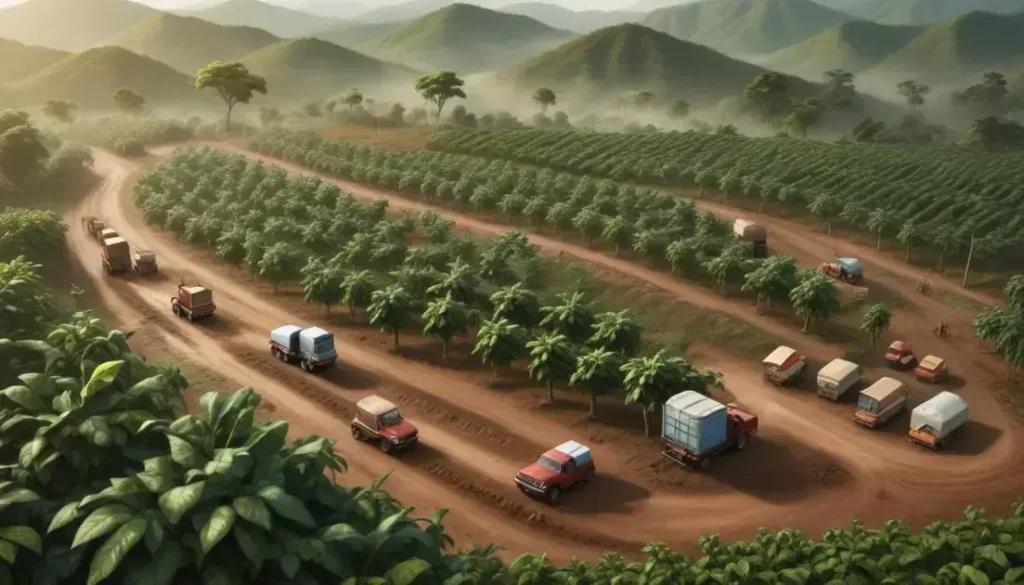The coffee supply chain faces significant challenges from climate change and fluctuating prices, requiring strategic adjustments such as sustainable practices, technological adoption, and strong partnerships to ensure resilience and ethical production.
The **coffee supply chain** is experiencing significant disruptions due to climate change, impacting producers and consumers alike. What does this mean for you?
Introduction to coffee supply chain
The coffee supply chain is a complex network that starts from the cultivation of coffee beans to the final delivery of your favourite brew. Understanding this process is crucial, especially as it is increasingly vulnerable to external factors such as climate change.
Primary Stages: The first stage involves the farmers who grow coffee. They often face challenges like changing weather patterns, which can drastically affect yield. In countries like Brazil and Vietnam, where a significant amount of coffee is produced, these fluctuations can lead to severe shortages.
Next, the beans undergo processing, where they are dried, fermented, and milled. This step is essential for enhancing flavour, but it requires stable climatic conditions and resources. Disruption here can lead to quality inconsistencies that affect global markets.
Distribution comes next, where logistics play a vital role. Coffee is transported across the globe, and any disruption can lead to delays and increased costs. For UK businesses, ensuring a consistent supply becomes a strategic priority as prices fluctuate and demand increases.
The final part of the chain involves retail, where consumers are impacted by pricing changes. This scenario raises questions about the fairness of pricing and how it affects both consumers and producers. Awareness of these dynamics can drive more informed choices among coffee drinkers.
Current coffee pricing trends
Recent trends in coffee pricing indicate a volatile market significantly influenced by various global factors. Supply chain disruptions, particularly due to climate change, have led to fluctuating prices, making it essential for businesses to closely monitor these changes.
Global Supply Challenges: Events such as poor harvests and shifting weather patterns impact coffee production countries like Brazil and Colombia. These disruptions can cause sudden price spikes, affecting both consumers and businesses in the UK. As a result, companies must develop strategies to mitigate risks associated with these fluctuations.
Moreover, increasing demand for specialty coffees in markets such as the UK has further influenced pricing. Consumers are willing to pay a premium for quality, pushing businesses to adapt their offerings accordingly. This shift towards high-end products creates both opportunities and challenges in pricing structures.
Exchange Rates play a crucial role as well. Since coffee is traded globally, fluctuations in currency values can significantly impact pricing. A stronger British pound can lead to lower prices for consumers; conversely, a weaker pound may result in higher costs.
Understanding these dynamics allows UK businesses to make informed decisions about purchasing and marketing strategies, ensuring they remain competitive in the ever-changing coffee market.
Impact of climate change on coffee production
The impact of climate change on coffee production is profound and multifaceted. Rising temperatures and unpredictable weather patterns significantly affect coffee crops, with countries like Brazil and Colombia being particularly vulnerable. These regions, known for their high-quality beans, are facing challenges that threaten their yield and quality.
Altered rainfall patterns can lead to droughts or excessive rainfall, both detrimental to coffee plants. During droughts, stress on the plants can result in lower yields and poorer quality beans. Conversely, excessive moisture can create conditions for diseases like coffee leaf rust, further jeopardising production.
Pests and diseases thrive in warmer temperatures, making coffee plants more susceptible. Farmers are often forced to adapt their practices, which can include shifting to more resistant bean varieties or changing planting schedules. These adaptations, while necessary, can result in increased costs and require additional knowledge and resources.
Moreover, the economic implications are significant. As production costs rise and harvests become less predictable, prices are likely to fluctuate. This instability could affect not only producers but also end consumers in the UK, as they may face higher prices for their beloved coffee.
Understanding these challenges allows stakeholders to develop strategies that foster resilience within the coffee industry, ensuring sustainability for future generations.
Key players in the coffee market
The coffee market is characterised by a diverse range of key players, each contributing to the complex supply chain. At one end, we have the farmers, who are the backbone of coffee production. They cultivate beans in various regions, primarily in countries like Brazil, Colombia, and Ethiopia, which are known for their high-quality coffee.
Next, **exporters** play a vital role in moving coffee from farms to consumers worldwide. These companies manage the logistics of transport, ensuring that the beans reach their destinations promptly and efficiently. Their expertise in navigating export regulations can significantly affect the cost and timing of shipments.
In the middle of this chain are traders and roasters. Traders handle bulk purchasing and selling of coffee, while roasters focus on transforming green beans into the aromatic product that consumers love. Their skill in roasting impacts the flavour profile, which is crucial for attracting discerning customers.
Finally, at the retail level, we find a variety of establishments ranging from specialty coffee shops to large supermarket chains. These retailers sell coffee to the end consumer, influencing market trends and customer preferences. Understanding the roles of these key players is essential for grasping the dynamics of the coffee market.
Effects on smallholder farmers
The effects of changing coffee prices on smallholder farmers are significant and multifaceted. These farmers depend heavily on the income generated from coffee cultivation, often facing challenges that threaten their financial stability. Volatile prices can lead to uncertainty in their earnings, making it difficult to plan for the future.
When prices decline, smallholder farmers struggle to cover their production costs. Many of them lack access to resources such as credit and technology, which makes it impossible to adapt efficiently to market fluctuations. Consequently, some may need to abandon their farms or shift to less profitable crops, impacting local economies.
Climate change further exacerbates these challenges. As weather patterns shift, productivity can diminish. Smallholder farmers often have limited means to invest in sustainable practices that could enhance resilience to climate impacts. This necessitates a reliance on traditional methods that may be less effective under changing conditions.
Moreover, the market’s demand for high-quality coffee presents both opportunities and hurdles. While premium prices for specialty coffee can benefit smallholders, the required quality standards must be met, often demanding additional investments in training and resources that these farmers may not afford. The complex dynamics of the coffee market create a pressing need for support mechanisms to enable these farmers to thrive in an increasingly competitive environment.
Vietnam and Brazil case studies
The case studies of Vietnam and Brazil offer valuable insights into the evolving dynamics of the global coffee market. Both countries are major coffee producers, but they face unique challenges and opportunities that illustrate the impact of factors such as climate change and market fluctuations.
In Vietnam, the rapid expansion of coffee cultivation has led to impressive growth in production volumes. However, the heavy reliance on a limited number of coffee varieties, particularly robusta, makes the sector vulnerable to climate extremes. Recent weather patterns have resulted in lower yields and increased pest infestations, prompting a need for diversification and sustainable agricultural practices.
Conversely, Brazil is the world’s largest coffee producer, known for its high-quality arabica beans. The country faces significant challenges from climate change, with rising temperatures threatening traditional growing regions. Farmers are increasingly experimenting with new techniques and varieties to maintain quality and quantity. Additionally, Brazil’s sophisticated supply chain infrastructure helps mitigate some risks associated with market volatility.
Both countries demonstrate how adapting to environmental and economic changes is crucial for maintaining competitiveness in the coffee industry. The lessons learned from their experiences can inform strategies for other coffee-producing nations, highlighting the importance of resilience and sustainability in an ever-changing market.
Consumer reactions to coffee price changes
Consumer reactions to coffee price changes reveal significant insights into purchasing behaviours and preferences. As coffee prices fluctuate, many consumers become more price-sensitive, reconsidering their choices regarding brand and quality. Premium coffees often face scrutiny when prices rise, leading some consumers to switch to more affordable alternatives.
In the UK, this shift can impact specialty coffee shops, where customers may seek to balance quality with cost. Loyal customers may hesitate to pay higher prices, which forces these establishments to justify their pricing through quality narratives or exceptional service. This delicate balance is crucial for maintaining consumer loyalty.
Moreover, consumers are increasingly aware of the sustainability of the products they purchase. When coffee prices rise, the conversation shifts toward ethical sourcing and the impact on farmers. Many consumers express a willingness to support sustainable practices, even if it means paying a premium, as they wish to contribute to fair trade and environmental preservation.
Social media also plays a role in shaping perceptions about coffee pricing. Online discussions and reviews influence public opinion and purchasing choices. When consumers share their thoughts about coffee prices on platforms like Instagram or Twitter, it can lead to widespread awareness and changes in buying behaviour.
Overall, consumer reactions to coffee price changes highlight the interplay between quality, value, and ethical considerations in today’s market.
Sustainability initiatives in coffee production
Sustainability initiatives in coffee production have become increasingly important as consumers demand ethically sourced products. These initiatives aim to reduce environmental impact while supporting local communities involved in coffee cultivation. Farmers are adopting practices that enhance biodiversity and promote ecological health.
One significant approach is the implementation of shade-grown coffee techniques. This method allows coffee to be grown under the canopy of trees, which helps preserve habitats for various species. Additionally, shade-grown coffee can improve soil quality and reduce the need for chemical fertilizers.
Another initiative involves integrating agroforestry systems, where coffee plants are cultivated alongside other crops. This approach not only increases biodiversity but also provides farmers with additional income sources, contributing to economic resilience.
Moreover, many coffee producers are embracing water conservation methods to ensure efficient use of water resources. Techniques such as drip irrigation and rainwater harvesting help reduce water waste and maintain essential supplies for coffee plants, especially in regions facing drought.
Finally, certifications such as Fair Trade and Rainforest Alliance signal to consumers that the products they purchase support sustainable practices. These labels foster greater accountability and transparency in the coffee supply chain, encouraging more brands to commit to sustainable coffee production.
Future projections for coffee supply
Future projections for the coffee supply are increasingly influenced by various global factors, including climate change, market demand, and evolving agricultural practices. As coffee consumption continues to rise, particularly in emerging markets, the need for sustainable and reliable production methods becomes crucial.
Experts predict that shifting climate patterns will impact traditional coffee-growing regions significantly. For instance, regions currently suitable for cultivation may become less viable, leading to a potential decline in overall supply. Consequently, farmers may need to adapt by altering their cultivation methods or transitioning to different coffee varieties that are more resilient to changing conditions.
Moreover, advancements in agricultural technology could play a critical role in the future of coffee supply. Techniques such as precision agriculture and innovative irrigation systems can enhance productivity while minimising environmental impact. Adoption of these technologies may help mitigate some adverse effects of climate change, supporting consistent and quality coffee yields.
Additionally, consumer preferences are shifting towards sustainably sourced coffee, which could reshape supply chains. As more consumers demand transparency and ethical sourcing, companies will need to adapt their practices to maintain competitive advantage. Overall, the future of coffee supply will hinge on integrating sustainable practices, technological advancements, and market responsiveness to ensure a stable and ethical coffee industry.
Strategic adjustments for UK businesses
As the coffee market evolves, UK businesses must implement strategic adjustments to remain competitive. These adjustments are vital in responding to challenges such as fluctuating coffee prices and changing consumer preferences. One key strategy involves enhancing supply chain efficiency. By streamlining operations and optimising logistics, businesses can reduce costs and ensure consistent product availability.
Additionally, embracing sustainability initiatives can significantly improve brand reputation. Consumers are increasingly favouring ethically sourced coffees, prompting UK companies to invest in sustainability certifications and transparent sourcing practices. This not only meets consumer demand but also contributes to a more sustainable coffee industry.
Furthermore, UK businesses should leverage technology and data analytics to better understand market trends and consumer behaviours. Implementing data-driven strategies can assist in anticipating demand fluctuations and tailoring product offerings accordingly, helping businesses adapt quickly to market changes.
Another important adjustment includes enhancing customer engagement. Businesses can utilize social media platforms and marketing campaigns to build relationships with consumers, fostering loyalty and encouraging repeat purchases. Engaging with customers about their preferences and feedback can guide product development and improve service quality.
Overall, strategic adjustments grounded in efficiency, sustainability, technology, and customer engagement are essential for UK businesses navigating the dynamic coffee market.
Conclusion: Addressing coffee supply challenges
Addressing the challenges in the coffee supply chain requires a multifaceted approach that encompasses various stakeholders. One of the main challenges is the impact of climate change. To combat this, farmers can adopt more resilient practices such as agroforestry and shade-grown coffee. These methods not only help in sustaining production but also enhance biodiversity.
Moreover, establishing stronger partnerships between farmers, exporters, and retailers is essential. By fostering collaboration, stakeholders can share resources, knowledge, and best practices to improve the overall efficiency of the coffee supply chain. This collaboration can lead to better prices for farmers, ensuring their livelihoods are supported.
Investing in technology is another critical element. Innovative solutions such as data analytics can help monitor crop health, predict trends, and optimise supply chains. By integrating these technologies, businesses can respond more swiftly to market demands and minimise waste.
Furthermore, consumer education plays a vital role in addressing supply challenges. Raising awareness about the importance of sustainable coffee can encourage consumers to make informed choices, thereby driving demand for ethically sourced products. This shift in consumer behaviour can significantly impact how coffee is produced and traded.
Together, these strategies can create a more resilient coffee supply chain that benefits all involved, from producers to consumers.
In conclusion, addressing coffee supply challenges is essential for a sustainable future
The coffee industry faces significant hurdles, from climate change to fluctuating prices. By implementing sustainable practices and fostering strong partnerships among stakeholders, we can ensure a more resilient supply chain.
Investing in technology will allow us to optimise production and respond quickly to market needs. Additionally, educating consumers about the importance of supporting ethically sourced coffee can create a demand for sustainable products.
Together, these efforts will help protect the livelihoods of coffee farmers and ensure that future generations can enjoy quality coffee while preserving the planet.
Common Questions about Coffee Supply Challenges
What are the main challenges facing the coffee supply chain?
The coffee supply chain faces challenges such as climate change, fluctuating prices, and the need for sustainable practices in production.
How can consumers support sustainable coffee production?
Consumers can support sustainable coffee production by choosing brands that prioritize ethical sourcing and sustainability certifications.
What role does technology play in addressing coffee supply issues?
Technology can help optimize agricultural practices, improve supply chain efficiency, and enable better monitoring of crop health and market trends.
Why is education important for consumers in the coffee market?
Educating consumers about the impacts of their coffee choices can drive demand for sustainable products, helping to foster a more responsible market.
What initiatives can farmers implement to enhance sustainability?
Farmers can adopt practices such as shade-grown coffee, agroforestry, and water conservation techniques to improve sustainability in coffee production.
How can partnerships improve the coffee supply chain?
Strong partnerships among farmers, exporters, and retailers can lead to better resource sharing, improved pricing for producers, and overall efficiency in the supply chain.


